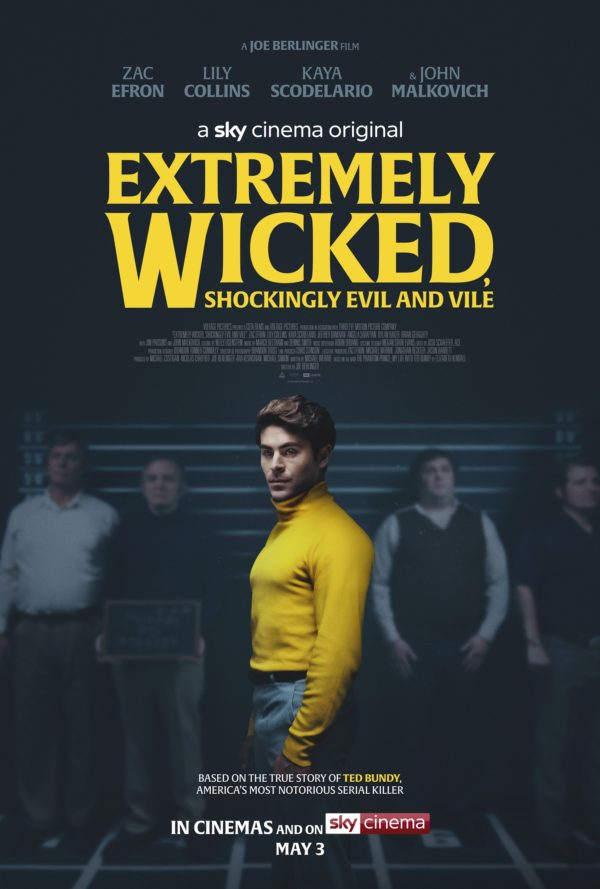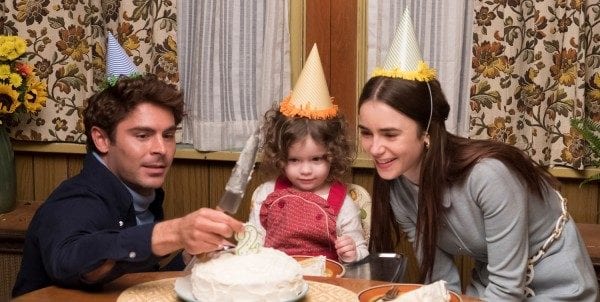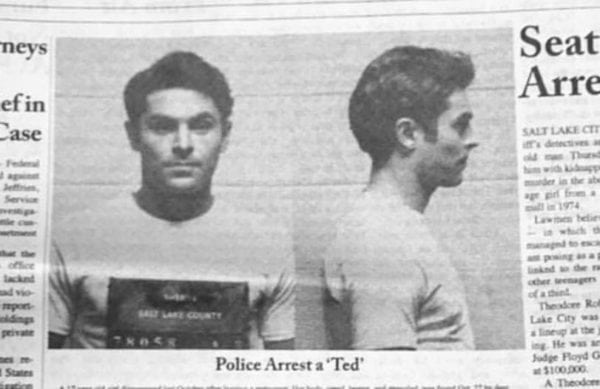Extremely Wicked, Shockingly Evil, and Vile, 2019.
Directed by Joe Berlinger.
Starring Zac Efron, Lily Collins, Kaya Scodelario, Jim Parsons, John Malkovich and Haley Joel Osment.
SYNOPSIS:
Through the eyes of his long-term girlfriend, we see the net close in on serial killer Ted Bundy, after years of getting away with his violent murders.
In the midst of the current wave of fascination with true crime stories, from Serial in podcast form to the two seasons of Making a Murderer on Netflix, the tale of Ted Bundy is a no-brainer to bring to the screen. Bundy is one of the most notorious serial killers in American history and, even on this side of the pond, his name is recognisable, even if the details of his crimes aren’t as widely understood. Filmmaker Joe Berlinger has in fact dedicated his career to Bundy in the last few years with multiple projects. In the wake of the impressive four-part Netflix doc The Ted Bundy Tapes earlier in the year, he’s back with a drama focused on Bundy – the awkwardly titled Extremely Wicked, Shockingly Evil, And Vile.
The twist here is that the story is, ostensibly at least, told from the point of view of Bundy’s long-term girlfriend Elizabeth Kloepfer (Lily Collins). We meet her visiting Bundy (Zac Efron) on Death Row, but the narrative cross-cuts between the visit and their first meeting back in 1969. The opening of the movie is a strangely piecemeal affair, recounting the relationship between Ted and Liz with little regard for coherent positioning in time. Berlinger delivers some ludicrous foreshadowing early on, with the camera holding on a knife Bundy is using to make breakfast and a doomy, orchestral score blasting out when a seemingly suspicious dog barks directly at him.
All of this would be fine if the film followed through with its shifted perspective. Berlinger’s subversion is that, because Liz doesn’t see the crimes, the audience doesn’t either. However, Lily Collins gets very little screentime as Berlinger is consistently drawn to Bundy, keen to simply cycle through the highlights of his documentary series rather than delivering on the promise of his concept. Anyone who has seen The Ted Bundy Tapes will find very little in the way of new material here and, indeed, watching the doc is almost a prerequisite to having a clue what is happening.
In his desire to get through all of the salient Bundy moments while avoiding ever depicting his crimes, Berlinger – perhaps inadvertently – seems to cloud the issue entirely to the point that someone watching without any knowledge of Bundy would possibly be convinced he’s innocent. When Bundy is first found guilty of kidnap, the film makes you feel almost sorry for him. In the world the audience has seen, he’s just a charming guy with a loving wife and a stepkid who adores him – not one of the most monstrous humans who ever lived.
The casting against type of Zac Efron in the lead role was the most interesting thing about this film going in, and it’s certainly not a bad performance. However, there’s nothing about his work that particularly amplifies the sinister side of Bundy – Efron mostly gets to play him fairly straight as a smoking hot charmer. It’s only in a handful of crucial scenes in the final act that Efron is able to spread his wings on the darker side of the character. Kaya Scodelario, meanwhile, is terrifying from the first moment she appears – hidden beneath an enormous pair of specs – as a woman clearly deep under Bundy’s spell.
Berlinger is clearly attempting to spotlight the thing that made Bundy such a successful killer – he was a handsome, boy next door type who didn’t look like a psychopath. However, in searching for that angle, the film sucks out its own soul. Like last year’s My Friend Dahmer, which simply followed Jeffrey Dahmer as a sullen, weird teenager, the film is trying so hard to find a new perspective that it removes everything that makes people so morbidly fascinated with these stories. The lurid portrayal of violent crime is gone, but so is the enthralling, stranger than fiction element that will get people into cinema seats. It’s just a husk.
Nowhere is this clearer than in the final act of the movie, which mostly focuses on Bundy’s trial in Florida. In Berlinger’s Netflix documentary, this is a sad and bizarre depiction of Bundy’s insanity, as he turns the legal proceedings into a circus in which he is the ringmaster. The movie’s take on the event sees John Malkovich as a grumpy judge whose job is merely to be irascible and talk about how warm Florida is, with Jim Parsons as the studious prosecutor. The opening prosecution statement allows the movie to dwell on all of the lurid details its concept has thus far hidden from the audience, while defining the victims entirely by the violence of their demise rather than ever giving them a voice, or even a face, in the story.
You’d be forgiven for asking where Lily Collins – the supposed protagonist – is in all of this. Sadly, the film basically asks her to spend the second half of the story crying a lot and cuddling Haley Joel Osment. It’s not exactly a fitting use of Collins’s considerable talents and makes a mockery of the film’s attempts to sell itself as offering a new perspective.
When Malkovich hands down his sentence, delivering the dialogue from which the movie gets its name, he also states that “I don’t have any animosity towards you”. Given how limp Berlinger is in showing what made Bundy evil, it’s easy to attribute the judge’s words to the movie as well. Listing Bundy’s victims on a title screen at the end feels like a rather pathetic attempt to justify their absence from what has come before. This is a movie that’s fascinated with Ted Bundy, and entirely uninterested in those whose lives he callously took away.
Flickering Myth Rating – Film: ★ ★ / Movie: ★ ★
Tom Beasley is a freelance film journalist and wrestling fan. Follow him on Twitter via @TomJBeasley for movie opinions, wrestling stuff and puns.
















